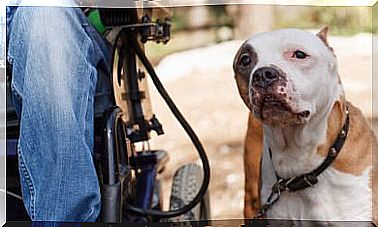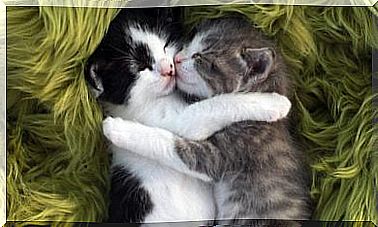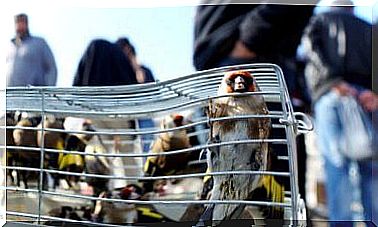How To Take Care Of An Orphaned Kitten
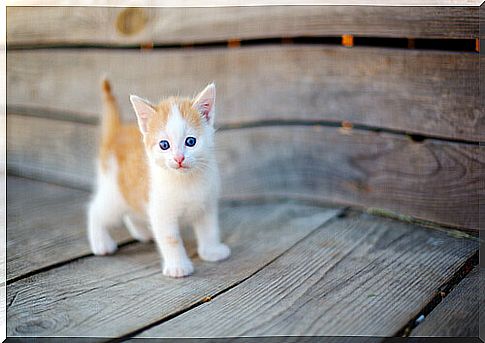
Saving an orphaned kitten is an act of pure love. But this feeling, the noblest of all, alone is not enough to take care, protect and guarantee the health and well-being of the kitten. As you know, mammals need contact with the mother and her precious milk. Not only is it the only possible way to develop a strong immune system, but from a psychological point of view, too mature weaning can produce behavioral problems.
Since, unfortunately, the abandonment of pets is still very frequent, it seemed only right to write a guide article on how to take care of an orphaned kitten .
Fortunately, many people, as well as institutional bodies and voluntary associations, NGOs and Non-Profits, do a great deal in favor of stray animals. Thanks to their time and charity, many of these orphaned kittens will be able to get a second chance by finding accommodation with new adoptive families.
What to do if you find an orphaned kitten?
If you happen to find an orphaned kitten less than 12 weeks old, it is very likely that it will be very frightened. It is also possible that it tries to defend itself or to flee by exploiting the few strengths it possesses. Therefore, it is important to remain calm and be patient when approaching a newborn kitten.
We recommend that you use gloves and do not maintain excessive contact with the animal. The kitten was abandoned and exposed to a huge amount of dirt and bacteria. So, without hesitation, the first step is to take him to the vet. The doctor will examine your new friend and advise you on the treatments to be taken to preserve his physical integrity and mental development.
It is best to let the rescued kitten rest in a suitable carrier. If you don’t have one yet, a cardboard box can also work, as long as it is sturdy enough to carry the little cat.
4 practical tips to rescue an orphaned kitten
1- Cat with milk or artificial milk
The greatest risk of a newborn kitten is the vulnerability of its organism. It is through their mother’s milk that puppies feed and develop their immune systems. In the first few weeks of a cat’s life, it is essential to provide adequate nutrition to ensure their survival.
In case it is not possible to find a cat with milk, it is best to consult the veterinarian. It will help you find the best artificial substitute. There are some brands of powdered milk for newborn cats: the important thing is never to give them cow’s milk. The lactose present in it can seriously damage the cat’s digestive system and cause even severe allergies.
2- Appropriate heat and environment
Usually, kittens are much more sensitive to cold than other adult dogs and cats. The light and young fur is best suited to temperate and dry climates.
In the first few weeks of life, cats cannot regulate their body temperature. The risk of getting sick from the cold or suffering from hypothermia is very high. Therefore, it is essential to provide it with heat quickly. A good solution is to use an electric blanket and place it in a dry and clean area. Warm and safe, the kitten will recover more quickly.
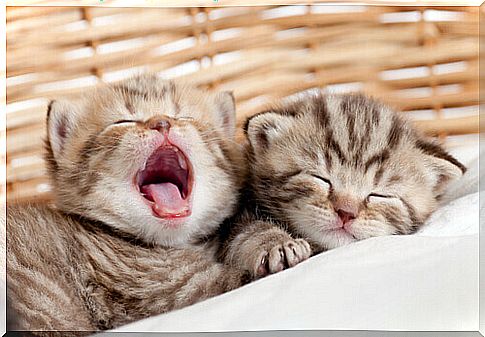
Another problem is related to the climate and thermal insulation of your home. In colder and wetter countries, great care must be taken not to expose the kitten to low temperatures. If you rescued the kitten in winter, the internal temperature should not drop below 24 degrees.
3- A clean and comfortable kennel for sleeping
The little kitty will feel vulnerable and will be very scared. Your task is to create a comfortable and safe environment, in which he can rest and recover tranquility. It is essential to have a clean, dry and warm area dedicated to your new roommate. For example, you can prepare a real doghouse. Just use a cardboard box with a clean, soft towel for the little animal to lie down on.
4- Care of cleanliness and hygiene
After a few weeks of life, the cat will easily learn to do his business in the litter box. But a newborn orphaned cat still does not know how to control its stimuli. Usually it is the mother cat who, by licking the small intimate organs, stimulates the puppy to fulfill their physiological needs. During the first few days, after each feeding, you will have to manually clean the kitten. You can use cotton or clean gauze, slightly wet with warm water.
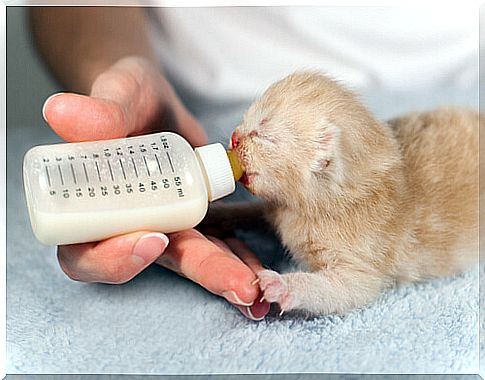
As soon as you notice that the kitten is about to do something, place it on a sheet of paper, in a newspaper or directly on the litter box, in the sweetest way possible.
In some large cities, uncontrolled cat breeding and overpopulation are becoming a real safety and even sanitation problem. Typically, a cat can give birth to 4-5 kittens every 65 days. This means that, in limited cases, a mother can give birth to about 25 puppies a year …
Sterilization is certainly an effective tool that allows you to fight against stray dogs. Moreover, it allows you to avoid many diseases that could jeopardize the health of your four-legged friend.
